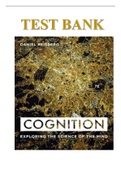-
1. Exam (elaborations) - Silvestri saunders comprehensive review for the nclex-rn examination, 5th edition, ph...
-
2. Exam (elaborations) - Test bank lehne’s pharmacotherapeutics for advanced practice nurses and physician a...
-
3. Exam (elaborations) - Test bank for medical surgical nursing 9th edition ignatavicius test bank questions w...
-
4. Exam (elaborations) - Test bank pathophysiology the biologic basis for disease in adults and children 8th e...
-
5. Exam (elaborations) - Test bank for clinical manifestations and assessment of respiratory disease 8th editi...
-
6. Exam (elaborations) - Test bank for medical surgical nursing assessment and management of clinical problems...
-
7. Exam (elaborations) - Brunner & suddarth textbook of medical-surgical nursing 14th edition hinkle, cheever ...
-
8. Exam (elaborations) - Test bank for pharmacology for the primary care provider 4th edition by authors: mari...
-
9. Exam (elaborations) - Test bank for dental radiography principles and techniques, 5th edition, joen iannucc...
-
10. Exam (elaborations) - Test bank for maternal and child health nursing care of the childbearing and childrea...
-
11. Exam (elaborations) - Test bank for medical-surgical nursing, 7th edition by adrianne dill linton and mary ...
-
12. Exam (elaborations) - Test bank for principles of pediatric nursing: caring for children, 7th edition by ja...
-
13. Exam (elaborations) - Test bank critical care nursing: diagnosis and management, 8th edition by linda d. ur...
-
14. Exam (elaborations) - Test bank for seidel’s guide to physical examination 9th edition by ball
-
15. Exam (elaborations) - Test bank for pediatric nursing: the critical components of nursing care, 2nd edition...
-
16. Exam (elaborations) - Test bank for professional nursing- concepts & challenges 9th edition by beth perry b...
-
17. Exam (elaborations) - Test bank for understanding pathophysiology 7th edition by sue huenther
-
18. Exam (elaborations) - Test bank maternal and child health nursing 8th edition silbert-flagg
-
19. Exam (elaborations) - Bates guide to physical examination and history taking 13th edition bickley test bank
-
20. Exam (elaborations) - Essentials of strategic management the quest for competitive advantage 6th edition te...
-
21. Exam (elaborations) - Test bank brunner and suddarth’s textbook of medical surgical nursing 14 edition
-
22. Exam (elaborations) - Wheeler test bank for psychotherapy for the advanced practice psychiatric nurse, seco...
-
23. Exam (elaborations) - Test bank for fundamentals of nursing 9th edition by carol taylor pamela lynn jennife...
-
24. Exam (elaborations) - Test bank for cognition exploring the science of the mind, 7th edition, daniel reisbe...
-
25. Exam (elaborations) - Test bank for varcarolis: essentials of psychiatric mental health nursing: a communic...
-
26. Exam (elaborations) - Test bank for primary care a collaborative practice, 5th edition by terry mahan butta...
-
27. Exam (elaborations) - Test bank for stahl's essential psychopharmacology: neuroscientific basis and practic...
-
28. Exam (elaborations) - Focus on nursing pharmacology 8th edition by amy m. karch test bank full test bank wi...
-
29. Exam (elaborations) - Test bank clinical nursing skills and techniques, 10th edition by anne griffin perry
-
30. Exam (elaborations) - Test bank for nelson pediatrics review(mcqs) 19 edition
-
31. Exam (elaborations) - Test bank for nursing research methods and critical appraisal for evidence- based pra...
-
32. Exam (elaborations) - Test bank for williams' essentials of nutrition and diet therapy, 12th edition by ele...
-
33. Exam (elaborations) - Test bank for dewit’s medical surgical nursing 4th edition stromberg
-
34. Exam (elaborations) - Test bank for maternal-child nursing, 6th edition by emily slone mckinney, susan r. j...
-
35. Exam (elaborations) - Porth's essentials of pathophysiology 5th edition test bank
-
36. Exam (elaborations) - Test bank for maternity and pediatric nursing 4th edition ricci kyle carman
-
37. Exam (elaborations) - Professional nursing concepts competencies for quality leadership 5th edition finkelm...
-
38. Exam (elaborations) - Test bank for clinical nursing skills: a concept-based approach 4th edition pearson e...
-
39. Exam (elaborations) - Test bank for structure & function of the body 16th edition kevin t. patton & gary a....
-
Show more




